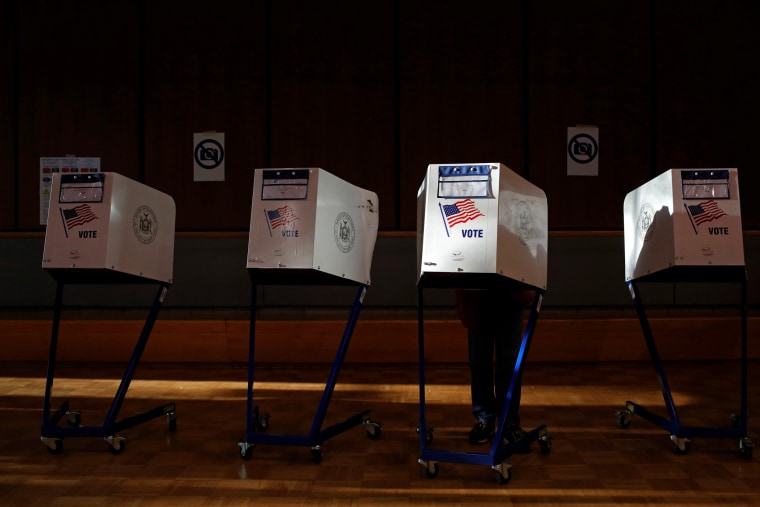Last week, U.S. intelligence officials brief House lawmakers on an important development: Russia is once again targeting our elections. The briefing touched off a series of provocative events, including Donald Trump's decision to name a wildly unqualified acting director of national intelligence.
As significant -- and potentially scandalous -- as these events are, Senate Minority Leader Chuck Schumer (D-N.Y.) published a tweet last night that stood out as notable.
Republicans keep blocking election security bills in the Senate, and now we know why: they'd rather let Putin win than stand up to President Trump.
It matters that the president, by some accounts, was outraged by Congress receiving politically inconvenient information from the intelligence community. It matters that Trump's actions may very well have a chilling effect on American intelligence officials. It matters that leading intelligence officials are being replaced by unqualified partisans.
But Schumer's point matters, too: maybe now would be a good time to revisit those election-security bills currently gathering dust on Capitol Hill?
The fact that Russia targeted U.S. elections four years ago is not seriously in dispute. What's more, the public and its representatives have been warned repeatedly that Vladimir Putin's government, pleased with the effects of its first attack, is likely to try again.
But if the latest reporting is correct, we're no longer talking about an abstraction. The issue is not a threat or a possibility. On the contrary, the evidence appears to show that a foreign adversary is already engaged in efforts to interfere with another American election cycle. The hazard is here -- and it's ongoing.
All of which brings us back to Schumer's point: perhaps lawmakers, confronted with this intelligence, can take a fresh look at legislative fixes intended to help defend the United States?
As we discussed last week, it was just last summer when Sens. Marco Rubio (R-Fla.) and Chris Van Hollen (D-Md.) partnered on an election-security proposal called the Defending Elections from Threats by Establishing Redlines (DETER Act). The idea was pretty straightforward: if U.S. intelligence agencies were to determine that Russia interfered in another federal election, new sanctions would kick in targeting Russia's finance, defense and energy sectors.
The point, obviously, would be to create a disincentive, letting the Kremlin know in advance that Russia would face significant economic consequences if Moscow once again attacked our democratic institutions.
The bill picked up a bipartisan group of co-sponsors, and it seemed like the sort of proposal that might even have a chance in the Republican-led Senate. Those hopes were dashed in December when the GOP balked: Sen. Mike Crapo (R-Idaho) insisted the bipartisan legislation had been "designed" to be bad for Donald Trump, and must, therefore, be defeated.
The circumstances seemed familiar for a reason: the DETER Act wasn't the only election-security measure to be rejected by Senate Republicans. The Democratic-led House last year passed the "Securing America's Federal Elections Act" (SAFE Act), which would, among other things, require voting systems to use backup paper ballots, mandate tech safeguards, and provide resources to states to improve their election-security measures.
In October, however, when Sens. Mark Warner (D-Va.), Amy Klobuchar (D-Minn.), and Ron Wyden (D-Ore.) tried to pass a package of election-related measures – including a Senate companion to the SHIELD Act – Republicans objected.
Soon after, the House also passed the Stopping Harmful Interference in Elections for a Lasting Democracy (SHIELD) Act, which would, among other things, require candidates to notify law enforcement authorities in the event of a foreign power offering campaign assistance.
Senate Majority Leader Mitch McConnell (R-Ky.) -- who picked up the "Moscow Mitch" moniker after balking at other bills on election security -- said his GOP-led chamber would ignore this bill, too.
A third bill, called the Securing America's Federal Elections (SAFE) Act passed the Democratic-led House in June, and it would require voting systems to use backup paper ballots and mandate tech safeguards.
Senate Democrats tried once again last week to advance all three bills. Republicans said no.
It's not too late for Congress to act. Perhaps the latest assessments from the intelligence community will jolt the GOP into action? It's hard to be optimistic.

